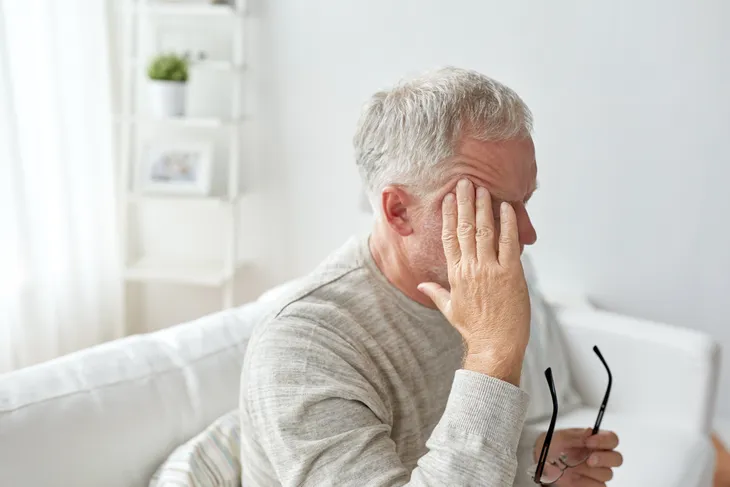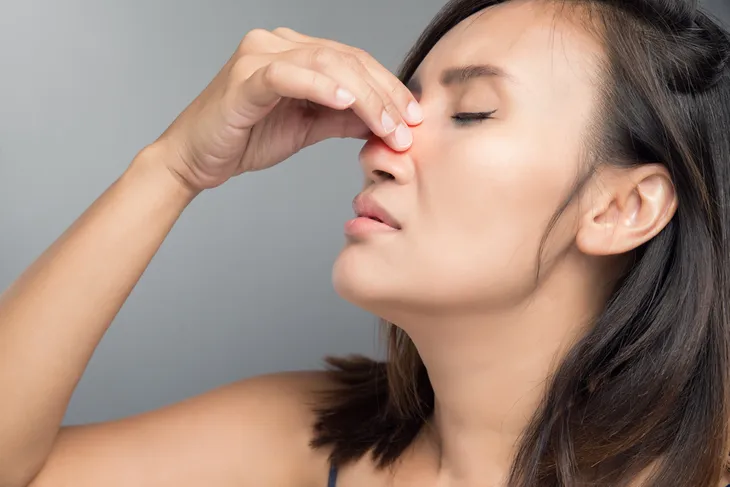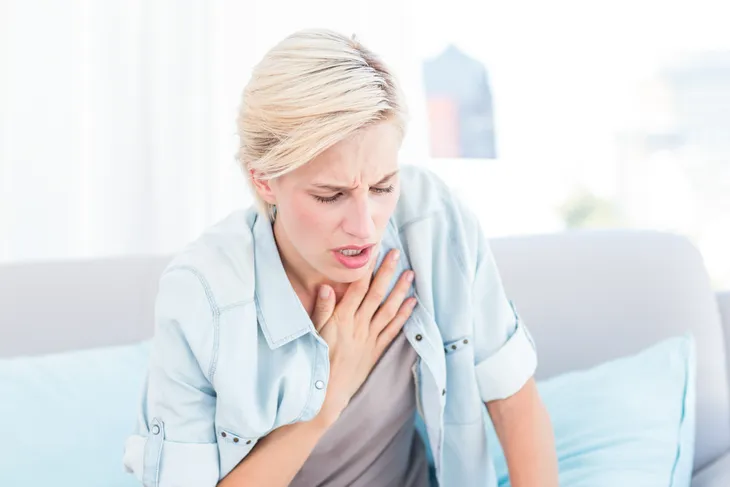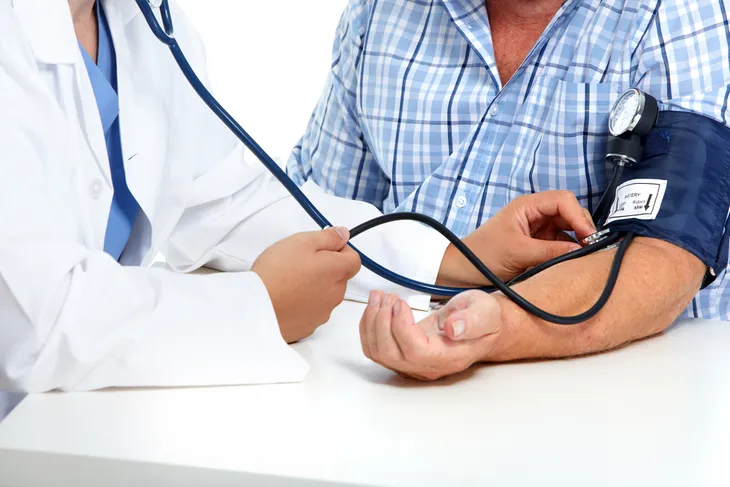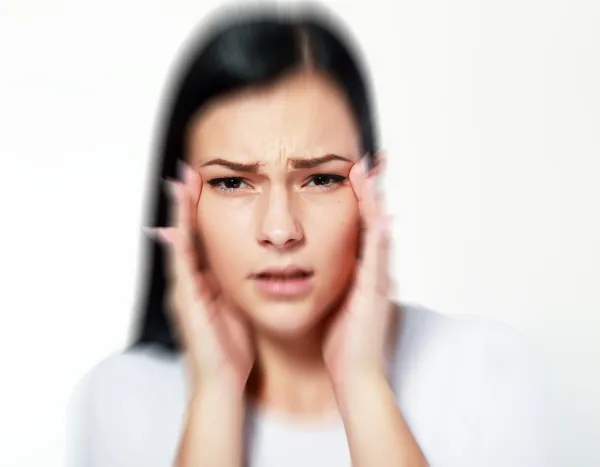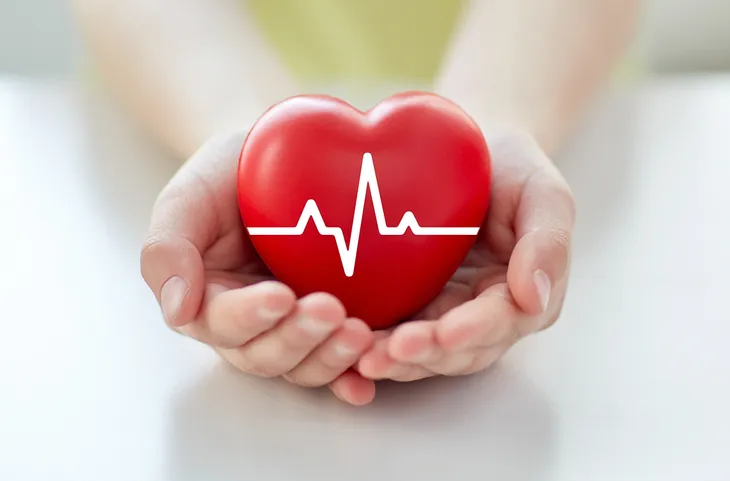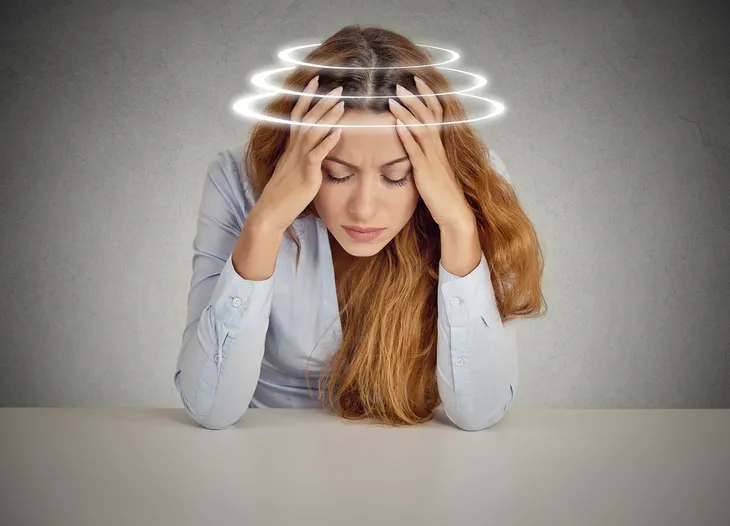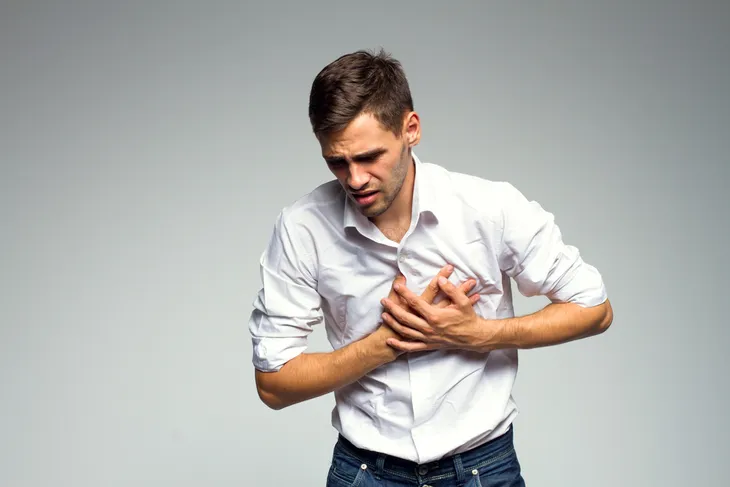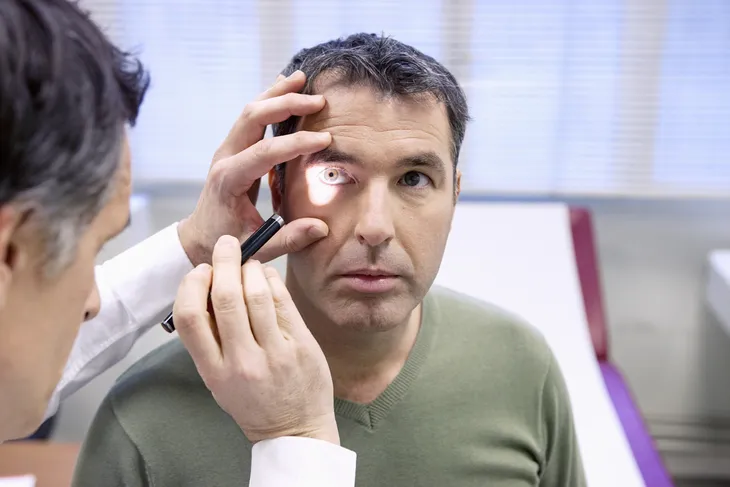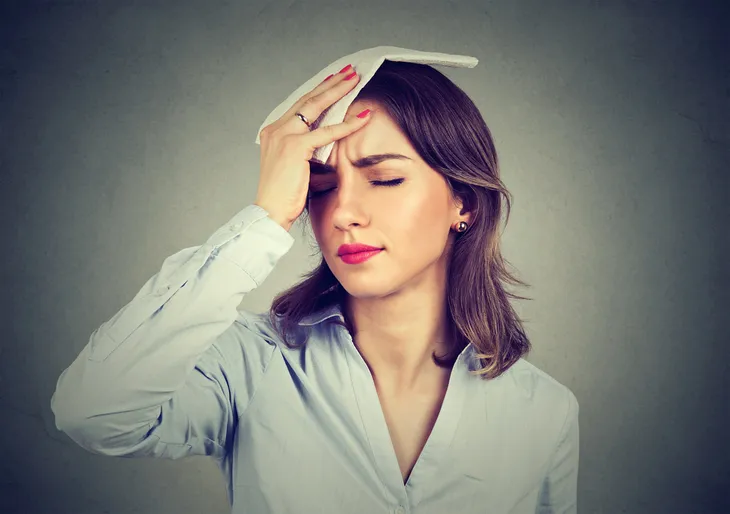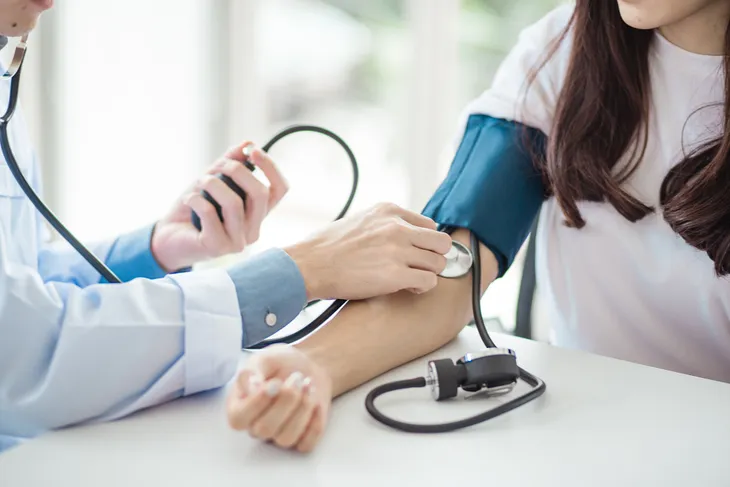Many people think the main symptom of high blood pressure (also known as hypertension) is feeling stressed or anxious, and while those two things are not mutually exclusive, they’re not usually signs of chronic hypertension. In fact, people with high blood pressure often won’t notice any changes until there’s serious damage, giving high blood pressure its nickname — “the silent killer.”
However, there are a number of other signs of unusually high blood pressure you may notice that can be cause for alarm. Left untreated, hypertension can lead to serious medical problems, including strokes, heart disease, and kidney failure, warns WebMD. Here are 13 possible symptoms of hypertension…
1. Headaches
There are a wide range of reasons why you’d develop a headache — one of them could be high blood pressure. However, research into the correlation between headaches and hypertension is ongoing, notes Healthline.com. “The verdict is out on whether or not high blood pressure can be proven to cause headaches,” it notes.
The source also notes some studies have found a connection, while others have not found a connection. However, it explains that a “hypertensive crisis” can cause a headache due to a sudden spike in blood pressure. “The resulting headache feels unlike any other kind of migraine or head pain,” it adds.
2. Nosebleeds
EveryDayHealth.com says if you’re suffering a nosebleed for no apparent reason, then high blood pressure may be the culprit. It says hypertension and hypertensive crisis (mentioned earlier) can cause your nose to bleed.
However, this probably isn’t the reason for your nosebleed. Other reasons include dryness, blood-thinning medications, chronic alcohol consumption, or another underlying health condition that makes it difficult for your blood to clot properly.
3. Shortness of Breath
This can occur in a particular type of hypertension known as “pulmonary hypertension,” notes the Cleveland Clinic. This is considered a rare lung disorder that narrows the arteries carrying blood from the heart to the lungs, causing unusually high pressure in the arteries.
Due to the increased pressure, the right ventricle of the heart becomes strained and expands in size. The symptoms, including shortness of breath while at rest, don’t usually appear until the problem has progressed – much like standard hypertension.
4. Decreased Pain Response
Medscape.com explains that the “associations between pain and blood pressure are potentially of great interest but poorly understood.” It says that experiencing pain itself can trigger high blood pressure, but conversely, hypertension can diminish sensitivity to pain (a condition called hypoalgesia).
The source says consistent findings show that those with hypertension do not experience pain the way people with normal blood pressure do. Strangely enough, this can have “a pain-relieving and possibly stress-relieving effect due to increased endorphin release,” it adds. This may lead the patient to believing they’re in good health, when it fact they have dangerously high levels of blood pressure.
5. Vision Problems
WebMD says that high blood pressure can lead to damage to the vessels that feed your retina (the back part of the eye where light is focused), a disease called “hypertensive retinopathy.” This condition is usually not noticed by the patient, but rather during routine eye exams.
The retina is essential to vision, as it’s the point where images are focused. Symptoms of this disease include bleeding in the back of the eye that a medical professional can detect using a special instrument called an ophthalmoscope, explains WebMD.
6. Irregular Heartbeat
WebMD also says those with “extremely high” blood pressure can expect problems, such as an irregular heartbeat, including palpitations that can cause your heart to skip a beat or flutter. However, as the source points out, palpitations can also occur from stress, excessive caffeine, nicotine, or alcohol.
However, an irregular heartbeat can be serious, and can cause chest pain, even fainting, notes the source. Your doctor may want to investigate the underlying cause of your abnormal heartbeat, so the right treatment can be applied. If there’s no apparent cause, changes in lifestyle can make an improvement.
7. Dizziness
Dizziness can be a symptom of many different medical conditions, but one thing is for sure, it’s not normal and is the body’s way of telling us something is wrong. In some cases it might be obvious, such as standing up too quickly, a lack of water, or watching a 3D movie. In these cases, it should pass as quickly as it came, but if it doesn’t pass quickly, it could be a warning sign of a stroke, which is caused by high blood pressure, says Women’s Health.
Dizziness can also be a side effect of some blood pressure medications, and even though it’s usually not caused by high blood pressure, it shouldn’t be ignored, especially if it comes on suddenly. “Sudden dizziness, loss of balance or coordination, and trouble walking are all warning signs of a stroke. High blood pressure is a leading risk factor for stroke,” writes Heart.org. If you are feeling dizzy and it isn’t passing, contact a doctor as soon as possible.
8. Pounding in Ears and Chest
Ever experienced pounding in the ears and chest after a really intense workout? This is because our heart is working extra hard to pump out blood. “If you have the sensations of pulsing or pounding in your chest or ears when you haven’t just exercised vigorously, you may have elevated blood pressure levels,” writes Healthy Women.
9. Bloated with Little Urination
Women’s Health talked to Amber Khanna, MD, a cardiologist at UCHealth University of Colorado Hospital, who explains that high blood pressure is often linked to kidney disease and diabetes, which is why many women will experience bloating and frequent urination. “In fact, many people first discover they have high blood pressure because their kidneys and potty habits go amok,” writes the source.
While it might seem strange, it’s important to keep an eye on any bathroom habits and be in the know about what is normal for you and what isn’t.
10. Blood Spots in the Eyes
Blood spots in the eyes, also referred to as subconjunctival hemorrhage, are what Heart.org call an inconclusively related symptom of high blood pressure. While they aren’t necessarily caused by high blood pressure, they are somehow indirectly related.
These sound pretty scary, and with good reason! While they are more commonly found in people who have diabetes or high blood pressure, these conditions don’t cause the blood spots. “Floaters in the eyes are also not related to high blood pressure. However, an eye doctor (ophthalmologist) may be able to detect damage to the optic nerve caused by untreated high blood pressure,” writes Heart.org.
11. Facial Flushing
Facial flushing happens when the blood vessels in the face dilate, and apparently, it doesn’t just happen when we’re embarrassed! This symptom is quite common and something we’ve all experienced before. It’s usually triggered as a response to spicy foods, wind, hot drinks, cold weather, sun exposure, or even skin-care products, says Heart.org.
The source goes on to explain, “Facial flushing can also occur with emotional stress, exposure to heat or hot water, alcohol consumption and exercise — all of which can raise blood pressure temporarily.” Heart.org also notes that while facial flushing tends to occur when we’re experiencing high blood pressure, it’s not necessarily the cause of facial flushing.
12. Nausea
Nausea isn’t a common symptom of high blood pressure, but it can happen. If it does happen, it’s usually also associated with other symptoms, such as dizziness and headaches. “As your blood pressure rises, your heart pumps out less blood, so you have less blood going to your organs,” writes Healthy Women. “That puts more pressure on your heart and brings less blood to your limbs and brain. That lack of oxygenated blood to the brain can make you feel nauseous.”
13. No Symptoms
High blood pressure (or hypertension) is often referred to as the “silent killer.” This is because it commonly strikes or creeps up on people without any forewarning, which is what makes it so dangerous. The most common symptom of high blood pressure is no symptoms at all, even when it reaches dangerously high levels, says the Mayo Clinic. Many people who have high blood pressure don’t even know it. The only way to ensure that you aren’t experiencing it without knowing, is to have regular check-ups. This is especially important if high blood pressure runs in your family, says WebMD.
“A few people with high blood pressure may have headaches, shortness of breath, or nosebleeds, but these signs and symptoms aren’t specific and usually don’t occur until high blood pressure has reached a severe or life-threatening stage,” notes the source.

